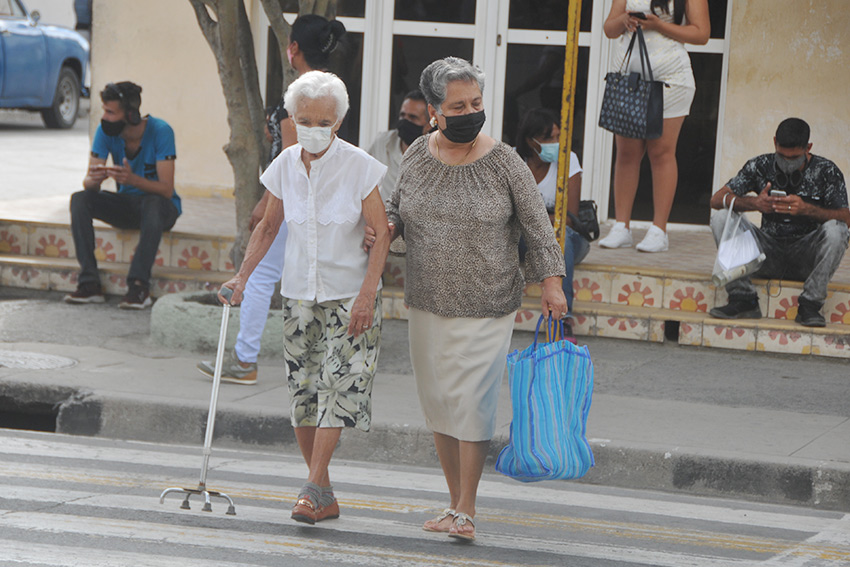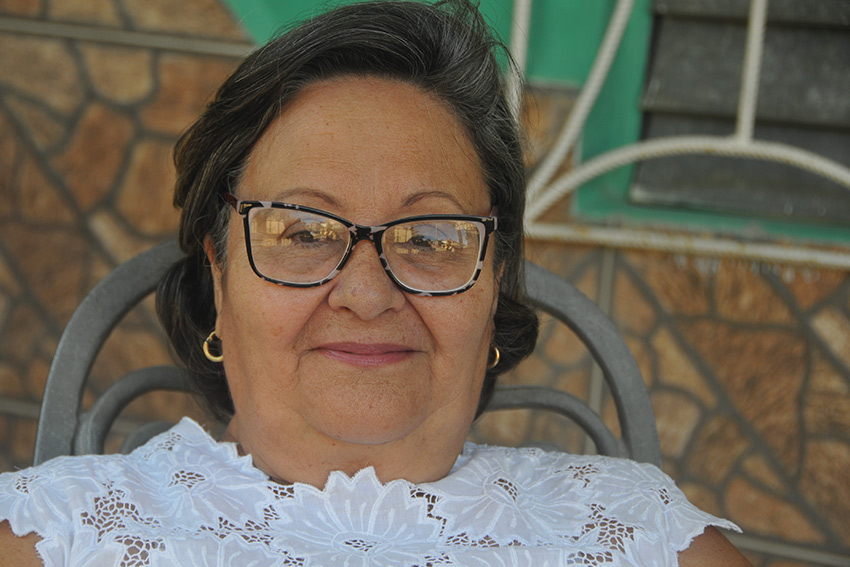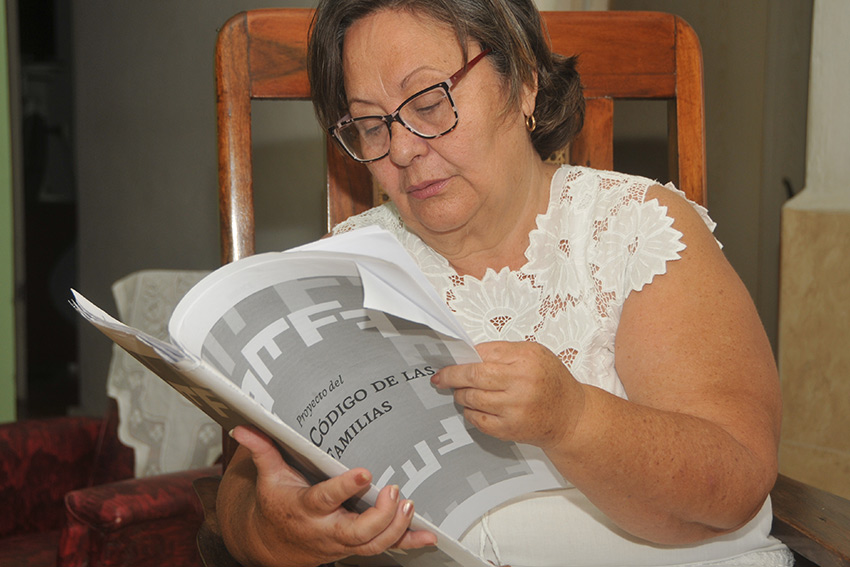
Julián walks his 87 years with the "impatience" of someone who takes three naps a day, never goes to the street, and does not separate for more than 30 minutes from his wooden rocking chair. Many times he ignores the faces that come and go... He does not interact with the generations of louder voices, receives food, and has become accustomed to not getting answers, even the most necessary ones.
He is even unaware, presumably, of the sharpest pain of his decline. Her relatives decided not to tell him that his lifelong companion passed away almost a year ago. Every day he asks when Chela will return from her granddaughter's house and only receives a resounding silence. On that same date they moved him from the first room to the back room, they disabled his battery-operated radio, and to this day "peace" reigns.
The younger ones, who monopolize the best positions at the time of the novel, do not know that the grandfather in other times was the pillar that kept the family afloat, that he had strong arms and on his shoulders, the three children took their first flights. Julián has arranged to have an early lunch and "decorate" the living room. The appointed hand offers him food, but there are no other demands. The old man is forgetting how the affections shelter.
NEW LAWS TO ADDRESS OLD DEBTS
In the daily life of the city of Las Tunas, perhaps, Julián's story goes unnoticed and the circumstances of other grandparents who live alone, who do not have the resources to go through this conclusive stage and are abandoned, stand out. But in the face of old age, an exhaustive look and the satisfaction of material needs are imposed together with that "abstract and intangible thing" that springs from affection and respect.
The treatment of the elderly acquires a growing relevance on the Island, especially because today about 2.4 million people in our nation live those years and we are called to be the most proportionally aged country in the Latin American and Caribbean region by 2030.

Given this scenario, the draft Family Code protects the self-determination, preferences, and equal opportunities of older adults, which favors their empowerment for fairer participation in society.
Bárbara Artiles Nodarse, a specialist in Civil and Family Law, assures 26 that in her experience as a prosecutor she has been able to experience a great number of situations that limit these people, conflicts that deprive them of their rights and assets. She considers that it is necessary to immediately expand the legal figures based on the existing reality and to have a legal body that contributes to their effective protection.
"The Code, in the universe that concerns us, exceeds our expectations - confesses Barbara. Although there has always existed in Cuba the will to protect this age group, we are in a moment of progress, because for the first time in the Magna Carta an article is dedicated to guaranteeing the exercise of their rights, and establishes what concerns the State, society and the family."
"Old age is a prize, we must prepare ourselves to reach it in the best way in all senses, and live it with dignity. The new regulation favors it; it is a call to the culture of peace, to unite in favor of enriching family environments so that our elders do not live like Julian, are not subjected to segregation, maintain their cerebral exercise, and are given participation."
FROM EXPERIENCE TO NOVELTY
Emilia never foresaw the outcome of the events that had been unfolding incognito in recent months. Her son Hector was behaving strangely, arriving late from work and in the evenings he was irascible and distant, even from his daughter. The confirmation of his infidelity blew up in her face on a Tuesday. After a large dose of scandal, his wife gathered up the belongings and left with the promise that neither she nor the child would ever set foot in that house again.
Emilia went to visit them that same afternoon at their former home, with granddaughter Ivette's favorite food in a pot. The former daughter-in-law wouldn't let her past the gate and wouldn't even let the little girl grab the smelly spaghetti with cheese. She accused her of covering up Hector's "shamelessness". She was rude, hurtful, and stubborn about the fact that she no longer wanted her in the child's life.
Since the separation, it has been more than six months. Emilia has never hugged Ivette again, nor can she bring her candy or buy her ice cream. At school, the teacher asked her not to go to see her anymore to avoid conflicts. The reason for her days has been fading...
Other grandmother friends, in the same situation, advise her to get used to it and think, like them, that her granddaughter lives in another country and is doing very well, and sometime, when she is older, she will come back to visit her. They suggest she pile on the hugs.
"Many times in the exercise of my profession I have dealt with cases like this, and today I feel great satisfaction when I see that mothers like Ivette's are now obliged to allow close communication between their infants and grandparents and other relatives. If it is infringed, they can request before the court to be granted such an opportunity. As we operators of the law say, we are fulfilling a historical debt to grandparents."
"Article 4 of this project details the rights in the family environment and highlights the aforementioned possibilities in terms of communication, self-determination, independence, and equal opportunities. Article 8, for its part, recognizes the relevance of older adults in the preservation of family traditions, the formation of the members of that nucleus, and the social transcendence of this."
"It is necessary to read the final provisions of this document and it will be possible to appreciate that important articles of the Cuban Civil Code are also modified to guarantee true protection. If this regulation is approved, the elderly will have the legal power to decide on their future from the present moment. They can choose their support, with whom they want to live in their last years..., no guardianship is established."
"Unfortunately, we know of elderly people who make donations of their estate and before a month has passed, they begin to be mistreated and are no longer taken into account. With this body of law, they can revoke the donation on the grounds of non-compliance due to ingratitude. In wills, know that if it is proven that someone benefited with a property, and other assets of an older adult for that matter, conspired against the physical and emotional state of this, does not receive the inheritance."
"Family caregivers have their space, they are protected, they inherit on equal terms (no matter if they are nephews or nieces) and receive double when it comes to distributing the inheritance. In addition, the possibility arises for the long-lived who live alone, not to go to a social institution, but to make effective a maintenance contract with whoever decides, in exchange for leaving him, let's say his home. The designated person will have to fulfill the pact, usually assigned to care and attention."
The Master in Legal Protection of the Elderly warns about situations that have to do with leaving children in the care of grandparents for trips abroad and, above all, international missions. She assures that this is a growing phenomenon and if it is applied without verifying the conditions it can affect not only the elderly but also the little ones, for lack of firm guidance.
"Grandparents can have the guardianship and care of minors temporarily and for justified causes, but it is necessary to evaluate their state of health to cope with the demands of the infant and their social interactions. This must be contemplated."
"Not only in this particular case but in all cases, to comply with the law, there must be sensitized specialists with the skills and training to deal objectively with family conflicts. It is not in vain that a chapter is dedicated to the need for the specialization of jurists."

FOR MORE RESPECT AND DIGNITY
Faced with the draft Family Code, the retired prosecutor advocates not only for commitment but also for knowledge and sensitivity. She urges study to raise the legal culture as a current urgency.
"In addition to reviewing the document, it is valid to read the press and listen to experts in the media, to understand that the range of opportunities offered to the elderly is a solution to old needs of Cuban society."
Beyond technicalities, the new legislation is nothing more than guaranteeing the answers that Julian, Emilia, and many others are waiting for. For him, to assert his right as the owner of the house, of the first room, of his unstoppable radio. For her, to break the wall that today separates her from her granddaughter. And although many do not see it now, Julian and Emilia concern everyone.
The Code takes an objective and necessary stance. From the juridical point of view, it offers a way to face the aging population, which will soon take hold in Cuba with majorities.





